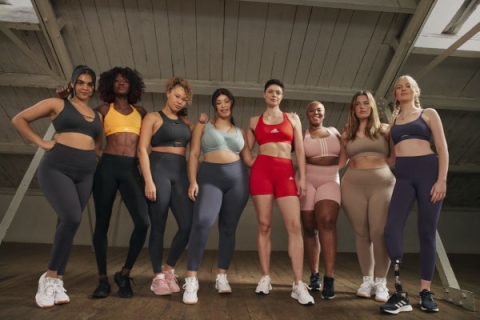

Professor Joanna Wakefield-Scurr shares the experiences and research underpinning Adidas' new sports bra campaign.
In February 2022, bare breasts made headlines. Adidas launched an unprecedented 43 new styles of sports bra, in 72 sizes, with a campaign spotlighting women’s physical diversity. But this wasn’t just about challenging representations of body image. It was part of a revolution in breast health.
Each new Adidas design is underpinned by scientific insight, courtesy of world-leading experts at Portsmouth. They’ve been working towards a revolution for years.
Professor Joanna Wakefield-Scurr, an expert in bra science and breast health, heads our Research Group in Breast Health. The Group is respected internationally for their work on the biomechanics (put simply: movement) of the breast.
Finding a better fit
So, what started Joanna on her research journey?

I was trying to exercise and experiencing significant breast pain. It lasted day and night. My doctor said, “You need a good bra.” When I started to investigate what makes a good bra, I was really disappointed by the lack of knowledge of breast biomechanics.
Joanna Wakefield-Scurr, Professor in Biomechanics, Faculty of Science and Health
Biomechanics should inform the development of any bra – from the support it offers and forces it can withstand, to its shape and position on the chest wall.
Joanna notes, 'Breasts change size, shape and position throughout the menstrual cycle and throughout life. So, bra size can change regularly. Despite this, there’s limited guidance for women to assess their bra fit.’
Wearing the wrong size can cause health problems including breast, neck, back and shoulder pain, bad posture, and rubbing and chafing which may lead to skin abrasions. It’s also been linked to a desire for breast reduction surgery and reluctance to exercise.
So, the Group developed an evidence-based video, to help women forget about size and focus on five simple steps to a good bra fit.
They also work with lingerie companies around the world, offering a scientific approach to bra development using 3D scanners and biomechanical technology.
Supporting Olympians
Research by Joanna and colleagues shows even elite level athletes suffer breast pain. And they put progress at risk by deferring training when the pain is at its worst.
A collaboration with organisations including the English Institute of Sport and bra manufacturer Clover Group saw Joanna’s team work with female British athletes before the Tokyo Olympics.
Of 51 athletes surveyed, a quarter said breast pain meant they couldn’t always give maximum effort in training or competitions. Of those tested, 94 per cent wore a sports bra – but three quarters had never had one properly fitted.

I was surprised and worried so many elite female athletes experience breast pain, and glad we’re working with them, because this can almost always be fixed.
Joanna Wakefield-Scurr, Professor in Biomechanics, Faculty of Science and Health
Researchers worked with the athletes to assess pain or discomfort, bra size and fit, and what can be done to reduce or eliminate pain. Excited by the potential benefits, Clover Group committed to make each athlete a bespoke bra.
Shaping the conversation
‘One thing that really surprised me when I started research in this area,’ Joanna says, ‘was how little women know about their breasts. Many don’t know what they’re made of, or how a bra works and how it should fit.’
So, the Group developed an education programme for schoolgirls, which led to significant improvements in knowledge and self-esteem. Joanna says:
‘We hope the project develops behavioural changes that stick with girls throughout their lives. They’ll be better informed about bras and their importance. And then they’ll educate their daughters.’
As the conversation about breast health evolves, Joanna and colleagues will remain among its most effective voices.
As a female scientist, I’m particularly proud to facilitate others to research an area that is female-related. I value being able to help young researchers develop.
Joanna Wakefield-Scurr, Professor in Biomechanics, Faculty of Science and Health
Professor Joanna Wakefield-Scurr is Professor in Biomechanics in the School of Sport Health and Exercise Science in the Faculty of Science and Health. She is also head of the Research Group in Breast Health at the University of Portsmouth.
